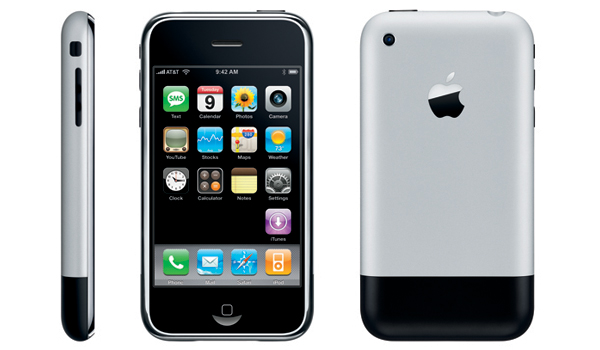iPhone six years on: the moment that changed tech
It's an iPod. It's a phone. It's an internet communicator. It's done quite well.

The Consumer Electronics Show is supposed to be a happy event, but in 2007 it felt more like a wake: on day two of the show, Apple held its own, separate event and showed off its latest product.
"An iPod. A phone. And an internet communicator," Steve Jobs said. "These are not three separate devices."
"Oh, shit," said the consumer electronics industry.
It became the talk of CES, even though Apple wasn't at CES. "I remember being sat in the CES press room alongside several other sweaty, exhausted journalists surviving on nasty coffee," TechRadar's deputy editor Dan Grabham recalls. "There was a bit of a hush over the room, although as I was working on something I didn't notice it until one of my colleagues turned to me and asked if I had seen what Apple had announced. I couldn't believe my eyes."
Grabham liked Macs, but "I'm not an Apple fan as a rule - but we knew this was big. The huge, whopping, massive deal was that it was a touchscreen, and what appeared to be an unbelievably good touchscreen with gestures."
The iPhone launch raised as many questions as it answered, Grabham says. "How had Apple done it - in cahoots with AT&T - without anybody finding out the details? How could it succeed in phones? What would it be like to use? Of course, we now know the answer to these questions, but at the time it seemed like there was a lot of stuff still to be worked out."
While Grabham sat in a room full of shell-shocked tech journalists, your correspondent blogged: "If this is as good as it looks, it could be more important than the Mac."
Sign up for breaking news, reviews, opinion, top tech deals, and more.
That turned out to be something of an understatement.
What the world is waiting for
"That was unbelievable," Grabham wrote in November 2007: he had "never experienced anything like the atmosphere". Was he at a secret U2 gig? A football match? The Victoria's Secret Lingerie Show? Nope. Grabham was in a shop - the Apple Store in London's Regent Street, as the iPhone hit the UK (the US launch had already taken place in June). The launch was "absolute pandemonium" involving headbutts, pratfalls and lots of cameramen and women.
Unlike more recent Apple product launches, where the queues consist largely of social media-advertising attention seekers and shifty types trying to buy 100 iPhones to sell at a profit overseas, the original queuers were normal people who really, really wanted to get their hands on the phone.
So what were they queuing for? On paper, the first iPhone wasn't that great: in our first review we noted its "considerable shortcomings". It didn't do 3G - we were stuck with the woeful EDGE network - or MMS, it didn't offer third party apps, it had an annoying recessed headphone socket, the camera was rotten and it didn't even do cut and paste. It wasn't cheap, either.
You'd have been much better off with a Sony Ericsson W960i or a BlackBerry Pearl 8120, we suggested at the time - wrongly, as it turned out. The W960i and Pearl were phones with some extra features. The iPhone was a handheld computer, and the phone bit was just another application.
It wasn't universally admired, of course. It was argued in these pages that the iPhone was "simply a repackaged version of what Palm, Sony Ericsson and Nokia have been doing for a long time... let's chat for a second about Apple's chances of making a dent in the mobile phone market." Today, of course, Palm and Sony Ericsson are no more, Nokia's barely hanging on and Apple is the most valuable technology company in the world, largely because of its mobile phone sales.

Contributor
Writer, broadcaster, musician and kitchen gadget obsessive Carrie Marshall has been writing about tech since 1998, contributing sage advice and odd opinions to all kinds of magazines and websites as well as writing more than twenty books. Her latest, a love letter to music titled Small Town Joy, is on sale now. She is the singer in spectacularly obscure Glaswegian rock band Unquiet Mind.